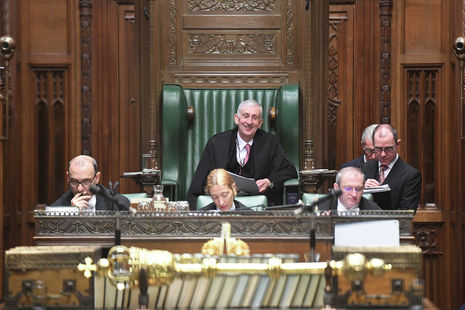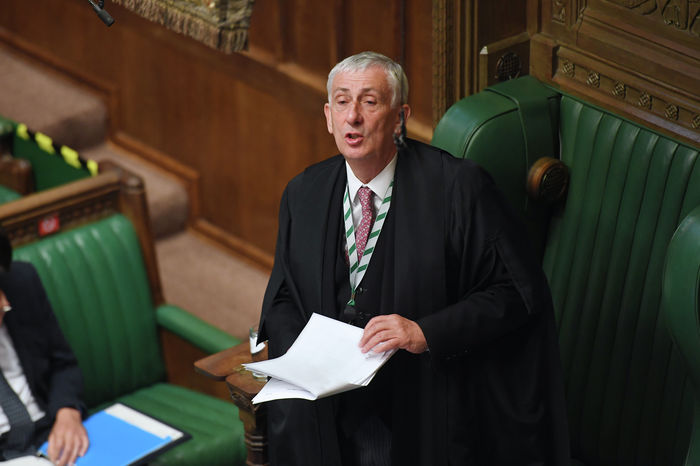The Gaza vote crisis reveals parliament’s deep dysfunction
Arguing over whether Lindsay Hoyle made the right decision obscures the real issue at the heart of this argues Calum Murray

In late February, the Commons erupted in fury at Speaker Lindsay Hoyle’s unorthodox decision to allow Labour to put forward an amendment on an SNP opposition day motion concerning a ceasefire in Gaza. Labour was at serious risk of parliamentary rebellion, with its leadership refusing to support the SNP motion as it lacked key conditions central to their position, notably the need to work towards a two-state solution. This put some Labour MPs in the difficult position of being asked to not to vote in favour of the SNP motion, and thus a ceasefire in Gaza, regardless of their own personal convictions as well as those of their constituents – a situation widely expected to lead to a seriously embarrassing rebellion for Keir Starmer. Hoyle’s decision saved him from this.
Cue outrage from SNP and Tory MPs, who walked out of the vote, arguing that Hoyle had changed parliamentary rules for the benefit of the Labour party. Reports of Keir Starmer visiting Hoyle unannounced did not help to diffuse the situation, though Hoyle is adamant that he did not bow to pressure from Keir Starmer.
“No real attempt has been made by parliament to constructively produce a resolution on Gaza”
Was Hoyle in the wrong? He claims that his main concern was the safety of MPs, who risked the wrath of constituents if they were seen to have voted against a ceasefire. Some, however, have suggested that this amounts to letting extremists pressure the Commons into taking a certain decision.
Many argue that Hoyle’s decision to allow a greater number of amendments to be raised would have helped parliament reach a middle ground. There is a great degree of consensus on the issue of Gaza. All parties want to see some sort of halt in the fighting, yet the two extremes presented by the SNP motion and Conservative amendment were not conducive to reaching this middle ground.
However, seeking consensus is not the point of opposition days. They are designed as a way for the opposition to challenge the government, and are not meant to formulate policy. Although the SNP were taking a slightly unorthodox approach by using it to attack Labour and not the government, it was nonetheless supposed to be an opportunity for the SNP to have their voices heard. The SNP wanted to make clear to the public the inadequacies of the Conservative and Labour approaches to the conflict. Hoyle deprived them of the chance of doing so by letting Labour take control of the narrative on an SNP opposition day, and evade criticism and scrutiny. Hoyle may have made his decision with noble causes in mind, but the ensuing frustration is understandable.
Focusing on Hoyle’s culpability, however, obscures the real issue here. Five months on from the start of the conflict, no real attempt has been made by parliament to constructively produce a resolution on Gaza. Ian Dunt, in his book How Westminster Works and Why it Doesn’t, shows why this is: the Commons have decreasing levels of power over government policy. Parliamentary legislative mechanisms are often disregarded in favour of policy formulated by the executive. The only real power opposition parties have comes from their ability to embarrass the government and dent their poll ratings.
“Parliament…has become a chamber purely for political theatre”
Therefore, events like opposition days are used not to try and influence government policy, since that would be futile, but are opportunities to score political points. This is what the SNP were ultimately trying to do. Hoyle’s decision, right or not, deprived them of one of a very small number of opportunities to do this in a parliamentary timetable controlled by the government. In any case, it is clear that the public are expecting something from Labour and the SNP that they simply cannot achieve. Votes like these are never going to change government policy on Gaza. The current political system does not allow it.
Therefore, instead of criticising or praising Hoyle, I deplore how parliament, in its inability to influence government policy, has become a chamber purely for political theatre. What this controversy tells us is that we desperately need to reform the relationship between the Commons and the government, so that it stops being a chamber for party political feuding and becomes one which can play an effective role in governance.
 News / Cambridge students set up encampment calling for Israel divestment6 May 2024
News / Cambridge students set up encampment calling for Israel divestment6 May 2024 News / Cambridge postgrad re-elected as City councillor4 May 2024
News / Cambridge postgrad re-elected as City councillor4 May 2024 News / Some supervisors’ effective pay rate £3 below living wage, new report finds5 May 2024
News / Some supervisors’ effective pay rate £3 below living wage, new report finds5 May 2024 Fashion / Class and closeted identities: how do fits fit into our cultures?6 May 2024
Fashion / Class and closeted identities: how do fits fit into our cultures?6 May 2024 News / Academics call for Cambridge to drop investigation into ‘race realist’ fellow2 May 2024
News / Academics call for Cambridge to drop investigation into ‘race realist’ fellow2 May 2024






